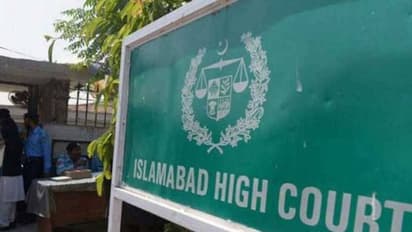Pakistan: 6 Islamabad HC judges, in letter to top court council, accuse ISI of intimidation

Synopsis
Six incumbent judges in Pakistan have leveled allegations against the country's intelligence agency, ISI, accusing it of meddling in judicial matters., according to a report by Dawn.
Six incumbent judges in Pakistan have leveled allegations against the country's intelligence agency, accusing it of meddling in judicial matters., according to a report by Dawn. The judges claim that the agency has engaged in intimidating tactics, including the abduction of at least one of their relatives and covert surveillance within their residences.
The Inter-Services Intelligence (ISI) is tasked with collecting and analyzing information crucial to Pakistan's national security.
On March 25, judges from the Islamabad High Court penned a letter addressed to the members of the Supreme Judicial Council. Recipients included Chief Justice of Pakistan Qazi Faez Isa, Supreme Court judges, and chief justices of the Islamabad and Peshawar High Courts. In their correspondence, they inquired about the presence of a potential executive policy, potentially enforced by intelligence personnel, aimed at intimidating judges.
The Supreme Judicial Council of Pakistan holds the highest authority in addressing complaints lodged against judges from the country's High Courts and Supreme Court, as well as taking necessary actions in response.
The six judges—Justices Mohsin Akhtar Kayani, Tariq Mehmood Jahangiri, Babar Sattar, Sardar Ejaz Ishaq Khan, Arbab Muhammad Tahir, and Saman Rafat Imtiaz—detailed seven instances where they allege intimidation by officials from the country's intelligence agencies, purportedly aimed at influencing the outcomes of cases of interest.
According to the letter, two of the three judges presiding over a case regarding the disqualification of former Prime Minister Imran Khan for allegedly concealing his daughter were reportedly pressured by individuals claimed to be "operatives of the ISI" through intermediaries such as friends and relatives.
The letter stated that one of the judges became so overwhelmed by stress from the episode that they required hospitalization.
Following the incident, discussions were held with the leadership of the Inter-Services Intelligence, during which they assured that intelligence officials would refrain from contacting the judges. However, despite these assurances, the alleged interference by intelligence operatives persisted. Rather than addressing the judges' complaints, they were subjected to victimization, as outlined in the letter.
Furthermore, the letter mentioned another purported incident where a brother-in-law of one of the judges was reportedly abducted by individuals claiming to be operatives of the intelligence agency.
The victim was allegedly “given electric shocks” and forced to record a video making allegations against the judge, it added.
In a separate occurrence, a judge from the High Court discovered that spy cameras had been installed in his home, capturing private videos of the judge and his family members.
“There has been no determination of who installed the equipment and who is to be held accountable”, the letter added.
The letter asserted that district judges have also faced intimidation from officials of the intelligence agency.
Furthermore, it urged the Supreme Judicial Council to convene a judicial convention to address the issue and establish a protocol for judges to follow when they encounter such situations.
Check the Breaking News Today and Latest News from across India and around the world. Stay updated with the latest World News and global developments from politics to economy and current affairs. Get in-depth coverage of China News, Europe News, Pakistan News, and South Asia News, along with top headlines from the UK and US. Follow expert analysis, international trends, and breaking updates from around the globe. Download the Asianet News Official App from the Android Play Store and iPhone App Store for accurate and timely news updates anytime, anywhere.